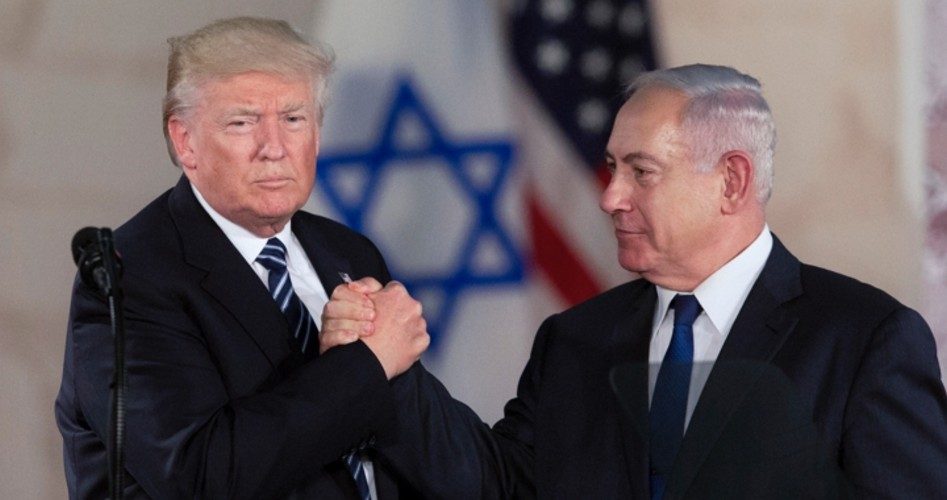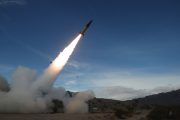
Israeli Prime Minister Benjamin Netanyahu may not be particularly satisfied with all that U.S. President Donald Trump said and did in his Middle East trip, which included a visit to Saudi Arabia and concluded with two days in Israel. Trump is clearly more liked by Israel’s leader than was Obama, but that is not, of course, a very high hurdle.
One possible reason that Netanyahu is much more favorable to Trump than he was to Obama is that Trump, like Netanyahu, sees the Obama “nuclear deal” with Iran as a bad deal.
But the two leaders disagreed on some key points. Trump has said that he sees an opportunity for “the ultimate deal” in the Middle East between Israel and its Arab neighbors, particularly Saudi Arabia. “We have before us a rare opportunity to bring security and stability and peace to this region and its people, defeating terrorism and creating a future of harmony, prosperity and peace,” Trump said at Ben-Gurion International Airport outside Tel Aviv. “But we can only get there working together. There is no other way.”
It is how Trump wants to do that “working together” that troubles Netanyahu. For example, Israel’s government was hoping that Trump was going to quickly announce the move of the American Embassy from Tel Aviv to Jerusalem, which Israel considers its capital city, rather than Tel Aviv, which is recognized by the “international community” as Israel’s capital. Despite Trump’s vow in last year’s presidential campaign to move the embassy, he is dragging his feet on actually doing so, apparently fearing it would enrage Palestinians and their allies in the Arab world.
During his 2016 campaign, Trump also supported new Israeli settlements in the West Bank, but now his administration is asking Israel to delay any new projects.
Trump is the first American president to visit the Western Wall in Jerusalem, which is viewed favorably by the Israelis. The Western Wall is all that is left of the second Jewish temple, destroyed by the Romans in A.D. 70. The second Jewish temple’s construction began during the reign of King Herod the Great before the birth of Christ and was the temple that Jesus visited. As is required for vistitors to this holy site, Trump put on a kipa (skullcap) and placed a note between some of the wall’s massive stones. His daughter Ivanka, a convert to the Jewish religion, visited the wall as well. Ivanka’s husband, Jared Kushner, is Jewish, and he is one of Trump’s top advisors. Trump is a Presbyterian.
But Trump did not invite, nor was he accompanied by, any Israeli political leaders during the visit to the wall, clearly out of concern of offending Arab Muslims. The Western Wall is located near a large mosque, which is considered the third-holiest site in the Islamic religion. The Israelis call the spot the Temple Mount, and they were disappointed that Trump has refused to say the site belongs to Israel. It is the holiest site in the world to those who practice the Jewish religion.
Israel was restored as a nation in 1948, which provoked an immediate invasion by some of its Arab neighbors. Israel defeated the Arab armies then, and again in the Six-Day War of 1967, at which time they annexed East Jerusalem. Few nations have recognized the annexation, despite Israel’s claim of all of Jerusalem as its capital city. The Palestinian Arabs, on the other hand, see east Jerusalem as the capital of their desired state.
Trump also visited the Church of the Holy Sepulchre while in Jerusalem, which is located on the site where many Christians believe Jesus’s body lay before His resurrection.
Another source of contention between the United States and Israel was the $110 billion arms deal that Trump made with Saudi Arabia. This so upset many in the Israeli government that Netanyahu had to order his cabinet officers to meet Trump at the airport. But U.S. Secretary of State Rex Tillerson argued that the Israelis have nothing to fear from the Saudi arms deal. “There has been nothing entered into with the arms sales agreements with the kingdom of Saudi Arabia or any of the other countries that do not fully allow us to fulfill our commitments to Israel and the longstanding security arrangements we have with Israel.” He added that he was sure that he and Trump would be able to address any “concerns” the Israelis have with the deal.
Perhaps nothing concerns Israel more than Trump’s view that the ultimate solution to the Arab-Israeli conflict is the creation of a state for the Palestinian Arabs — the so-called two-state solution. Trump told Reuven Rivlin, president of Israel (a largely ceremonial post), “I was deeply encouraged by my conversations with Muslim world leaders in Saudi Arabia, including King Salman, who I spoke to at great length. King Salman feels very strongly and, I can tell you, would love to see peace with Israel and the Palestinians.”
Trump noted that fear of Iran should unite Israel and the Sunni Arab states. “There is a growing realization among your Arab neighbors that they have common cause with you in the threat posed by Iran, and it is indeed a threat, there’s no question about that.”
In addition to a change in attitude on Iran from Obama to Trump, the Israelis also liked Trump’s decision to bomb a Syrian airbase, which came in response to the alleged use of chemical weapons by Syrian President Bashar al-Assad in the long-running Syrian civil war. While the Israeli government approved of the attack, many Americans fear that the fall of Assad would bring a more extreme government to power in Syria — a concern that should be shared by Israel.
Still, the relationship between the United States and Israel has clearly improved since Trump became president on January 20. “Today we reaffirm the unbreakable bond of friendship between Israel and the United States. We want Israel to have peace,” Trump promised. “There are many, many things that can happen now that would never have been able to happen before.”
For his part, Netanyahu said, “We appreciate the reassertion of American leadership in the Middle East. For the first time in my lifetime, I see a real hope for peace.”
Trump is slated to visit Bethlehem (the birthplace of Jesus), which is under the control of the Palestinian Authority. At that time, he will visit Palestinian Authority President Mahmoud Abbas. Later in the day, he will lay a wreath at the Yad Vashem — the Holocaust Remembrance Center — and give a speech at the Israel Museum.
After leaving the Middle East on Tuesday afternoon (Tuesday morning here), Trump is headed to Europe where he is expected to visit Brussels, the headquarters of the European Union (EU). Hopefully, what Trump experiences there will harden his resolve that America should not entangle itself in any multilateral trade deals such as the ones that led to the European super-state, with its reduction in liberties for the people of the EU.
Photo: AP Images



